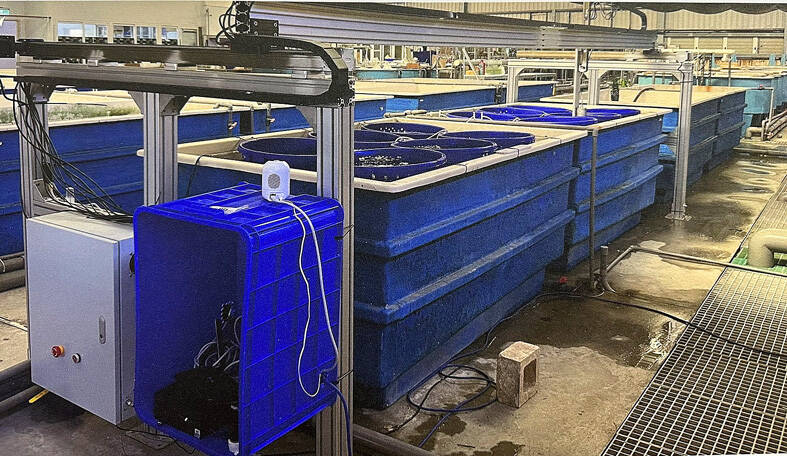Taiwanese scientists have developed an algorithm that could tell when lobsters are about to molt, in a technological breakthrough that can be a boon for aquafarms supplying the soft-shell crustacean delicacy.
The computer-based image recognition system — which detects a molting lobster through changes in behavior, carapace shedding, activity frequency and other visual clues — could help aquafarms save labor, the state-run Fisheries Research Institute said on Friday in a news release.
A lobster farm with 10,000 cages can save 20 to 30 percent of time with the system, said Cheng Ming-chung (鄭明忠), the researcher who designed it.

Photo: Yang Yuan-ting, Taipei Times
By tracking the movements of the crawfish and taking exact carapace measurements, the system can identify the lobsters that are about to molt and predict the time the change is to happen, he said.
The lobsters under observation are assigned a color code, with green meaning no action required, while yellow indicates that the specimen is to molt in 24 hours and red indicates that the staff should prepare to harvest immediately, Cheng said.
As lobsters readily devour members of their own kind, harvesting lobsters within 30 minutes of molting is crucial for farms, Cheng said.
Individual cages can prevent the loss of a recently molted lobster to cannibalism, but the unpredictability of molting cycles means that a round-the-clock watch must be kept, which is cost-prohibitive, he said.
Many gourmet restaurants specializing in French or Japanese cuisine seek soft-shell lobsters, he said, adding that such crawfish is worth NT$2,000 per kilo, which is double the price of regular lobsters.
The system’s ability to reduce reliance on manual labor has significant advantages to the industry, Cheng said.

Taiwan has received more than US$70 million in royalties as of the end of last year from developing the F-16V jet as countries worldwide purchase or upgrade to this popular model, government and military officials said on Saturday. Taiwan funded the development of the F-16V jet and ended up the sole investor as other countries withdrew from the program. Now the F-16V is increasingly popular and countries must pay Taiwan a percentage in royalties when they purchase new F-16V aircraft or upgrade older F-16 models. The next five years are expected to be the peak for these royalties, with Taiwan potentially earning

STAY IN YOUR LANE: As the US and Israel attack Iran, the ministry has warned China not to overstep by including Taiwanese citizens in its evacuation orders The Ministry of Foreign Affairs (MOFA) yesterday rebuked a statement by China’s embassy in Israel that it would evacuate Taiwanese holders of Chinese travel documents from Israel amid the latter’s escalating conflict with Iran. Tensions have risen across the Middle East in the wake of US and Israeli airstrikes on Iran beginning Saturday. China subsequently issued an evacuation notice for its citizens. In a news release, the Chinese embassy in Israel said holders of “Taiwan compatriot permits (台胞證)” issued to Taiwanese nationals by Chinese authorities for travel to China — could register for evacuation to Egypt. In Taipei, the ministry yesterday said Taiwan

‘LIKE-MINDED PARTNER’: Tako van Popta said it would be inappropriate to delay signing the deal with Taiwan because of China, adding he would promote the issue Canadian senators have stressed Taiwan’s importance for international trade and expressed enthusiasm for ensuring the Taiwan-Canada trade cooperation framework agreement is implemented this year. Representative to Canada Harry Tseng (曾厚仁) in an interview with the Central News Agency (CNA) said he was increasingly uneasy about Ottawa’s delays in signing the agreement, especially as Ottawa has warmed toward Beijing. There are “no negotiations left. Not only [is it] initialed, we have three versions of the text ready: English, French and Mandarin,” Tseng said. “That tells you how close we are to the final signature.” Tseng said that he hoped Canadian Prime Minister Mark Carney

POSITIVE DEVELOPMENT: Japan and the US are expected to hold in-depth discussions on Taiwan-related issues during the meeting next month, Japanese sources said The holding of a Japan-US leaders’ meeting ahead of US President Donald Trump’s visit to China is positive news for Taiwan, former Japan-Taiwan Exchange Association representative Hiroyasu Izumi said yesterday. After the Liberal Democratic Party’s landslide victory in Japan’s House of Representatives election, Japanese Prime Minister Sanae Takaichi is scheduled to visit the US next month, where she is to meet with Trump ahead of the US president’s planned visit to China from March 31 to April 2 for a meeting with Chinese President Xi Jinping (習近平). Japan and the US are expected to hold in-depth discussions on Taiwan-related issues during the